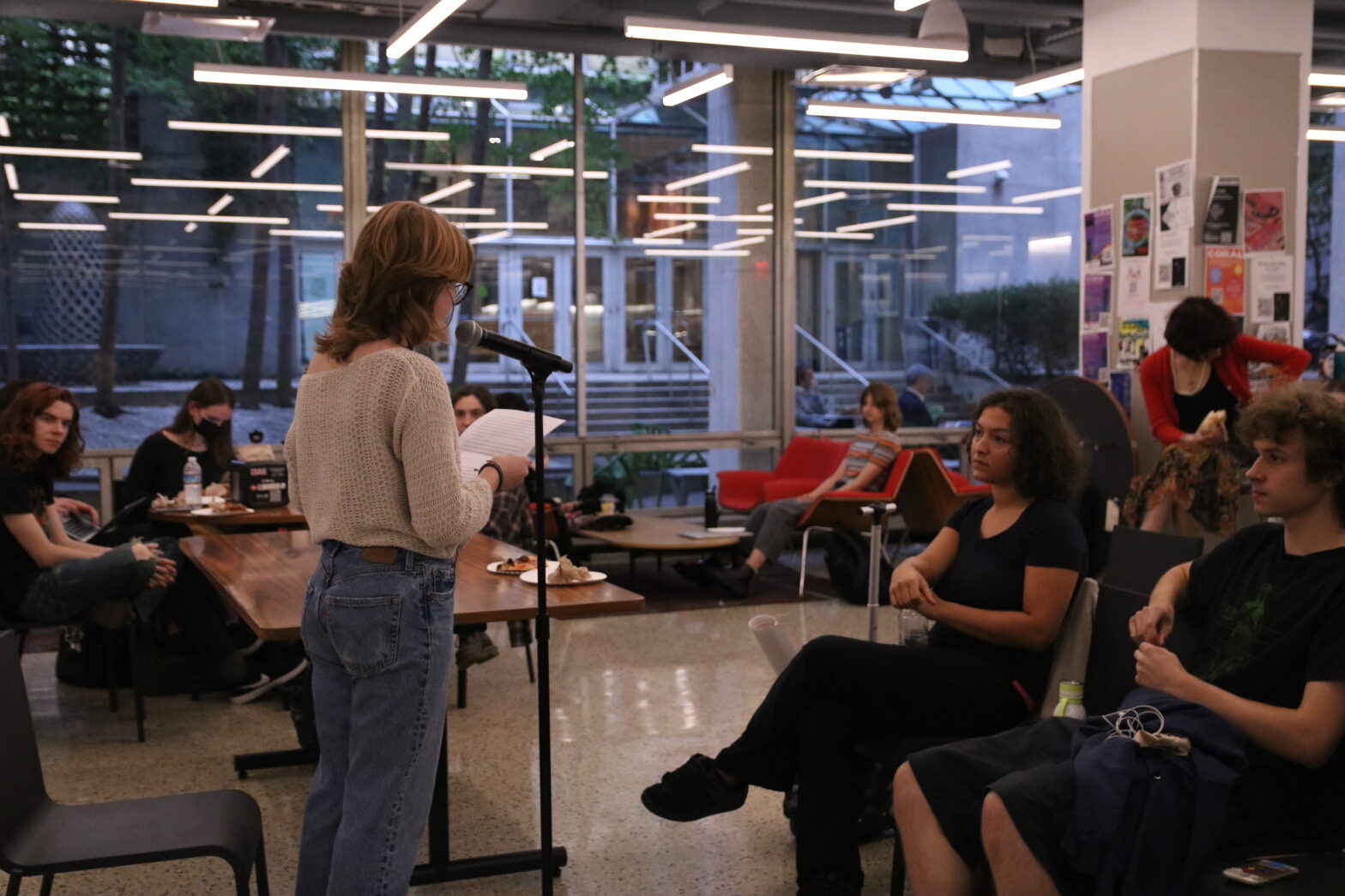On the evening of Oct. 12, the Lang Cafe dimmed its fluorescent glare to invite the creative community of the student-run Eleven and a Half literary magazine as they prepared for their annual open mic. The rich notes of a saxophone wafted through the room, competing with the warm scent of free dinner, which undermined the price of a New York slice. Students hovered in circles around a few rows of chairs set up to face a lonely mic stand — soon to be graced with the art of words.
Eleven and a Half produces a new issue every spring, showcasing works of fiction, nonfiction, poetry, and visual art from New School students and faculty. Their open mic aims to broaden their audience, accumulate submissions for their upcoming issue, and reinforce a sense of community that Eugene Lang College of Liberal Arts infamously lacks.
“I think that we all have this tendency to be very isolated and afraid because you know, that’s easy. And one of the things that has been striking me as really important lately is Lang having a community and feeling bonded together,” Amy Sihler said, a fiction editor for Eleven and a Half and the MC for the night. “It’s nice to be vulnerable, but also to have a laugh and just spread the word about what Eleven and a Half is,” Sihler said, as far as what the night held in store.
Conversations began to dwindle as Sihler gathered students’ attention away from their individual chatter. Her jovial disposition brought smiles to the quaint audience, and when she referred to the Lang Cafe as “the Lang cage” laughter rippled through the crowd.
After an honest land acknowledgement and recognition of the capitalist agendas and pressures that haunt the creative world, students began emerging from the growing audience to read their writing from phones and the occasional printed paper.
Each student was given no longer than five minutes at the mic to spell the room with their talent. There were poems about killing snakes, transgender rage, becoming the ocean, and pigeon envy; stories about the plague of emoting and how to get a free trip to Marlboro Ranch; day-old lyrics accompanied by a soft banjo strum. Stereotypical to any liberal arts involved function, a few lines of James Joyce’s “Ulysses” surfaced, but to maintain originality they were read through a harmonica.
Perhaps met with the biggest applause was Chandel Hampton, a New School cafeteria worker, who took her place behind the mic in the midst of her closing shift at the Lang Cafe. She sang a few lines from the musical “Dreamgirls,” her smooth hum ricocheting across the cafe as if it were a church with good acoustics.
“I’ve been working here for a couple of years … the youth and their talents and their gifts, it’s just, I feel it. Like I’m connected in some type of way,” Hampton said. “You know once you’re around people that have the same aspirations as you, it just comes out.”
Hampton’s perspective was shared by students as well. “Whenever I see other people reading their stuff, it just makes me excited to share my stuff,” said Radha Peacock, a student at Lang and a reader from earlier that evening. “It’s a fun audience … It’s a bunch of Lang kids. I feel like anything goes in a way that’s really, really fun. You can tell by the community poem. I was like, oh my gosh, that is the essence of the Lang courtyard.”
The community poem Peacock mentioned consisted of an aggregation of lines written by mostly anonymous students, who visited the Eleven and a Half table in the Lang courtyard during the weeks preceding the open mic. Read by Celia Shanley, a poetry editor of Eleven and a Half and New School Free Press reporter, the poem began with “October is doing strange things to my head,” taking the audience on a peculiar literary journey that was an explicit portrayal of collaboration, both humorous and sincere.
While writing can easily be reduced to a solitary act, Eleven and a Half’s open mic challenged this belief in more ways than one. “Just to have writing read aloud is so inherently powerful and it makes people more comfortable in their own skin and more comfortable around their peers,” Sihler said. Sharing vulnerability doesn’t have to be burdensome, and letting it live in a physical space is one of the ways it can become a universal truth that resonates with others. In turn, it can become a basis for connection as well as a celebration of collective creation.








Leave a Reply